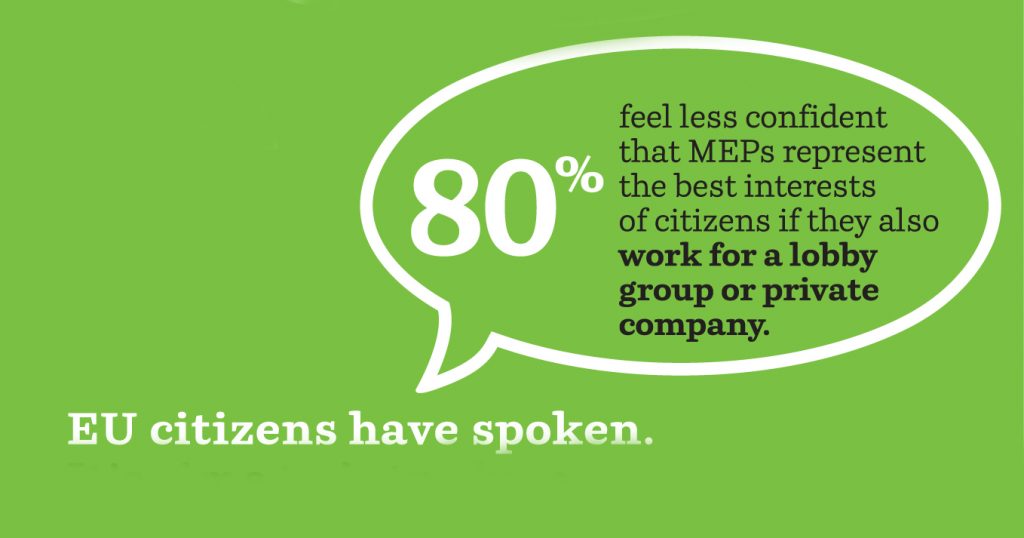A little bit more than one year after the introduction of a new ethics code for Members of the European Parliament, the parliament’s first report about how it is functioning has been published.
The report by the parliament’s advisory committee was released discreetly at the end of February. It provides useful statistics and reflections about the first year of operation of the code. However, careful analysis of the findings by Friends of the Earth Europe raises questions about the effectiveness of the new transparency system, which requires each MEP to submit a Declaration of Financial Interests (DoFI).
The system lacks strong implementing rules – a major shortcoming which has been pointed out by Friends of the Earth Europe repeatedly over the last year.
In reaction to the advisory committee report, Friends of the Earth Europe finds:
- Over the last year, the committee received 32 requests for guidance from MEPs suggesting only a small number of the 754 MEPs currently in mandate had questions about how to declare their outside interests.
- 88 of the submitted declarations of interest (12%) did not contain any information other than the name of the MEP and the date of submission. Therefore the Advisory Committee’s recommendation to introduce monitoring procedures allowing it to make analysis of empty declarations is very welcome.
- One single case of an alleged breach of the code was referred to the Committee by the President. This case was brought to the attention of President Schulz by organisations including Friends of the Earth Europe, Corporate Europe Observatory, LobbyControl and Spinwatch, which noticed that Jean-Luc Dehaene MEP had failed to declare stock options worth several millions of Euros. They were concerned that the missing stock options might have gone unnoticed by the Parliament’s authorities if they had not raised the alarm. Combined with the low number of requests sent to the advisory committee, this raises questions about whether the current systems allows for proper screening of MEPs’ outside interests, and whether other cases of undeclared interests exist.
- The Advisory Committee’s suggestion on how to declare holdings is welcomed. Removing mentions of “potential public policy implications” and “significant influence” would allow for all MEPs’ holdings to be declared and avoid that judgements about which holdings need be declared is left up to MEPs’ interpretation.
- The report acknowledges that “uncertainties and inconsistencies” exist in the wording of the code itself, not only its application. This suggests a need for clarifications and possibilities for improvements in the text itself in the future.
Natacha Cingotti, transparency campaigner at Friends of the Earth Europe commented: “The report announces a few welcomed improvements, such as the introduction in the future of an electronic system for filing declarations of interest and maybe a dedicated website. More fundamentally this report hints at the current limitations and contradictions in the code and the absence of implementing rules. These are long overdue and it is urgent that strict implementation is ensured, including through the extension of the mandate of the advisory committee towards a fully investigative capacity.
“The case of the stock options of Jean-Luc Dehaene has shown that making the code a fully working tool requires not only guidance for MEPs on how to declare their interests but also action to ensure that all potential and actual conflicts of interest are effectively dealt with.”
An earlier analysis of MEPs’ DoFIs by Friends of the Earth Europe found that one in four MEPs claim to have had no occupation before entering Parliament. While 118 MEPs declare at least one remunerated activity in addition to being an MEP, 19 of them do not disclose how much income they receive. This raises questions about the accuracy of the data provided and highlights the need for stricter monitoring of the declarations.
Friends of the Earth Europe calls on the President and the Bureau of the European Parliament to urgently bring forward implementing measures sufficient to make the code a fully working tool. At a minimum, these should include strict guidance on declaring and accepting gifts and hospitality and an extended mandate for the advisory committee.







